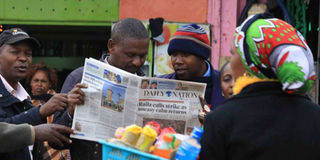The battle to keep Americanisms from creeping into our media

Matatu operators in Nyeri Town on August 14, 2017 read a copy of the Nation. The Nation Stylebook requires journalists to use British English. PHOTO | FILE | NATION MEDIA GROUP
What you need to know:
- NMG journalists are struggling to keep Americanisms from creeping into their stories. A recent Google search of the Daily Nation shows hundreds of Americanisms that have crept into the publication.
- Readers expect consistency. They don’t expect the same word to be spelt differently in the same publication or the same thing called by a different name.
Andy Cons was upset because the Daily Nation used the word “gotten” in one of its editorials. In British English, got, not gotten, is the past participle of get.
The sentence containing the offending Americanism read: “The county governors have gotten the wrong end of the stick.”
Gotten is an Americanism, not used in British English. However, it’s used in a hyphenated form with the prefix ill, as in ill-gotten money, ill-gotten gains, ill-gotten profits, et cetera. The word ill-gotten has the same meaning in American as in British English.
But the word gotten has different possible meanings. Examples: “MCAs have gotten quite good at impeaching speakers,” “Beatrice has gotten herself a pepper spray for self-defence,” “She and Mike have always gotten along.”
Back to Cons’s complaint. “Your editorial of today uses ‘gotten’ instead of got and yet the Cambridge Encyclopaedia of English categorically states that the two words are the most distinct differences in the American and British English,” he said. “Is the Nation now changing to the American English?”
NATION STYLEBOOK
The complaint is justified inasmuch as the Nation Stylebook requires journalists to use British English. The stylebook is intended to give uniformity to NMG publications so that all words appear in the same form each time.
The stylebook requires journalists to stick to British English for consistency. For example, they should always write “She was wearing grey trousers”, not “gray pants”.
Grey is British, gray is American. Pants is American English for trousers. Pants in British English are knickers or underwear for women and girls.
Similarly, they should always write “She loves biscuits and white coffee”, not “cookies and coffee with cream”, which is American English.
They should write “She dreamt one day she would own a saloon (car), not “dreamed one day she would own a sedan”, which is American English.
AMERICAN ENGLISH
They should write “Amos got her a car for her 50th birthday”, not “Amos had gotten her an automobile for her 50th birthday”, which is American English.
They should write “Kenyans will pay Sh125 for a litre of petrol if new prices are legalised”, not “Kenyans will pay Sh125 for a liter of gasoline if new prices are legalized”, which is American English.
They should write, “I smelt a rat”, not “I smelled a rat”, which is American English.
Other examples of Americanisms NMG journalists should avoid are spoiled (for spoilt), stabilize (for stabilise), somber (for sombre), skepticism (for skepticism), pyjamas (for pajamas) and so on.
They should also avoid Americanisms such as drunk driving (for drink-driving), drugstore (for a chemist), garbage can (for dustbin), candy (for sweets), period (for full stop) and so on.
INCREASING USAGE
I think the choice of British English comes naturally to us. In school we’re taught British English, the language the coloniser brought to our shores more than 100 years ago.
Since then, we’ve been hypnotized — sorry, hypnotised — by the Queen’s English, plus or minus such Kenyanisms as “My names are…”, “Even me”, “Isn’t it?” and “Are you getting me?”
But clearly, NMG journalists are struggling to keep Americanisms from creeping into their stories. A recent Google search of the Daily Nation shows hundreds of Americanisms that have crept into the publication.
For example, the word “cooperation” (for co-operation) has been used 9,488 times, gray (for grey) 684 times, spoiled (for spoilt) 370 times, organize (for organise) 240 times, cookies (for biscuits) 213 times, elevator (for lift) 185 times and liter (for litre) 240 times though some of the instances could have been mentions of Liter, a place in Kerio Valley.
CONSISTENCY
Readers expect consistency. They don’t expect the same word to be spelt differently in the same publication or the same thing called by a different name.
Words such as centre, labour and catalogue should always be spelt the same way — not at times as center, labor and catalog.
Similarly, that lifting device that moves people up and down a building should always be referred to as a lift, not elevator at some other times in the same publication.
Send your complaints to [email protected]. Call or text 0721 989 264





